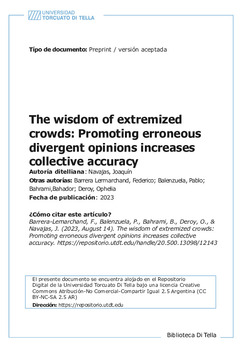Mostrar el registro sencillo del ítem
The wisdom of extremized crowds: Promoting erroneous divergent opinions increases collective accuracy
| dc.rights.license | https://creativecommons.org/licenses/by-sa/2.5/ar/ | es_AR |
| dc.contributor.author | Barrera Lermarchand, Federico | es_AR |
| dc.contributor.author | Balenzuela, Pablo | es_AR |
| dc.contributor.author | Bahrami,Bahador | es_AR |
| dc.contributor.author | Deroy, Ophelia | es_AR |
| dc.contributor.author | Navajas Joaquin | es_AR |
| dc.date.accessioned | 2023-11-21T16:58:30Z | |
| dc.date.available | 2023-11-21T16:58:30Z | |
| dc.date.issued | 2023 | |
| dc.identifier.uri | https://repositorio.utdt.edu/handle/20.500.13098/12143 | |
| dc.description.abstract | The aggregation of many lay judgements can generate surprisingly accurate estimates. This effect, known as the “wisdom of the crowd”, has been demonstrated in domains such as medical decision-making, factchecking news, and financial forecasting. Therefore, understanding the conditions that enhance the wisdom of the crowd has become a crucial issue in the social and behavioral sciences. Previous theoretical research identified two key factors driving this effect: the accuracy of individuals and the diversity of their opinions. Most available strategies to enhance the wisdom of the crowd have exclusively focused on improving individual accuracy while neglecting the potential of increasing opinion diversity. Here, we study a complementary approach to reduce collective error by promoting divergent and extreme opinions, using a cognitive bias called the “anchoring effect”. This method proposes to anchor half of the crowd to an extremely small value and the other half to an extremely large value before eliciting and averaging their estimates. As predicted by our mathematical modeling, three behavioral experiments demonstrate that this strategy concurrently increases individual error, opinion diversity, and collectively accuracy. Most remarkably, we show that this approach works even in a forecasting task where the experimenters did not know the correct answer at the time of testing. Overall, these results not only provide practitioners with a new strategy to forecast and estimate variables but also have strong theoretical implications on the epistemic value of collective decision-making. | es_AR |
| dc.format.extent | 32 p. | es_AR |
| dc.format.medium | application/pdf | es_AR |
| dc.language | spa | es_AR |
| dc.publisher | Universidad Torcuato Di Tella | es_AR |
| dc.rights | info:eu-repo/semantics/openAccess | es_AR |
| dc.subject | Anchoring | es_AR |
| dc.subject | Collective decision making | es_AR |
| dc.subject | collective intelligence | es_AR |
| dc.subject | diversity | es_AR |
| dc.subject | Forecasting | es_AR |
| dc.subject | Wisdom of the Crowd | es_AR |
| dc.title | The wisdom of extremized crowds: Promoting erroneous divergent opinions increases collective accuracy | es_AR |
| dc.type | info:eu-repo/semantics/preprint | es_AR |
| dc.type.version | info:eu-repo/semantics/submittedVersion | es_AR |

